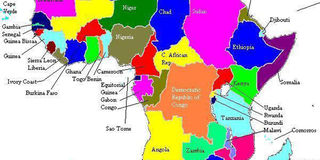Armed conflicts persist as Africa marks continental day

What you need to know:
While African diplomats want the people to uphold the pan-Africanist values of the founding fathers of the Organization of African Unity (OAU) in 1963 and harp on solidarity, thousands of people continue to be killed or maimed or displaced in conflicts across the continent.
HARARE, (Xinhua) -- Armed conflicts and bouts of xenophobia have prevailed in Africa over the years, and as the continent commemorates its continental day on Thursday, May 25, the call to silence the gun on the continent gets louder.
While African diplomats want the people to uphold the pan-Africanist values of the founding fathers of the Organization of African Unity (OAU) in 1963 and harp on solidarity, thousands of people continue to be killed or maimed or displaced in conflicts across the continent.
The OAU is predecessor to the African Union (AU), which aspires for peace, shared prosperity and well-being, unity and integration on the continent, among other values.
Yet more than 15 countries are embroiled in one form of conflict or the other, with wars in Somalia and South Sudan claiming the highest numbers of fatalities in 2017.
Armed conflicts in Africa are concentrated in four regions - North Africa and the Sahel, West Africa, the Horn of Africa and the Great Lakes.
According to the United Nations High Commissioner for Refugees, in late 2015 about 16 million people in Africa were either displaced or forced to flee to other countries.
About 10.7 million of them were internally displaced persons while the remaining 5.2 million were people that fled their home countries mainly to seek refuge in neighboring countries.
Zimbabwe has since the beginning of 2016 granted refugee status to about 900 people who have been displaced by conflict in neighboring Mozambique, while about 3,500 others are staying with relatives along the border.
One of the inmates at Tongogara Refugee Camp in eastern Zimbabwe, Tendai Ndlovu (34), told Xinhua recently that she was happy to be living away from the ravages of war.
However, poor living conditions worried her.
"We are facing a shortage of food, water, clothes, blankets and cooking utensils. Our children are not going to school and we do not have any piece of land to till," she said.
The camp accommodates about 10,000 refugees from the DRC, Mozambique, Burundi, Rwanda, Somalia, Cote d'Ivoire, Mali, Ethiopia, Eritrea, Ghana, Kenya, Uganda and Sudan.
In South Africa, bouts of xenophobic attacks continue to take place on migrants from across the continent going to that country in search of greener pastures.
More than 200 foreign nationals, mainly blacks, have fallen victim to xenophobic attacks in no less than 15 incidents since 1994, with African leaders urging the South African government to ensure the attacks do not continue.
The theme of the African Union for 2017 is "Harnessing the demographic dividend through investments in youths" and dovetails with the continental body's Agenda 2063 which places importance in investing in youths through education, skills development and entrepreneurship.
Agenda 2063 seeks to ensure that all African countries enjoy some form of industrialization by the year 2063, leading to continental socio-economic transformation.
Zimbabwe's Foreign Affairs Minister Simbarashe Mumbengegwi said the theme would be discussed in detail at the AU ordinary session in July to come up with specific measures to harness the youth demographic dividend.
"It is necessary that as we celebrate this day our youth are encouraged to rekindle the spirit of unity, togetherness and solidarity as demonstrated by our founding fathers," he said in a statement to mark Africa Day.
However, it has generally been the youths who have been leading xenophobic attacks in South Africa and also engaging in acts of political violence in other countries.
Mumbengegwi said Agenda 2063 spelt out the need to silence guns by the year 2020 as a fundamental base for development on the continent.
"Peace and security are prerequisites for successful implementation of Agenda 2063. It is imperative to mobilize adequate resources to strengthen Africa's peace and security architecture," he said.




